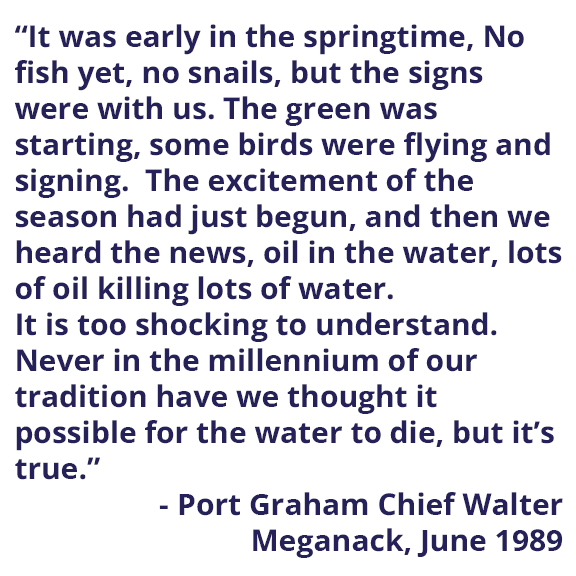On this page:
- Project Jukebox – Oral History of Exxon Valdez oil spill
- The Spill: Personal Stories from the Exxon Valdez Disaster
Personal stories of Exxon Valdez spill preserved in University of Alaska Fairbanks’ oral history archives
 Twenty-five years after the Exxon Valdez disaster, the voices of local citizens were preserved as part of the Oral History Program at the University of Alaska Fairbanks.
Twenty-five years after the Exxon Valdez disaster, the voices of local citizens were preserved as part of the Oral History Program at the University of Alaska Fairbanks.
The university created this archive of stories, known as “Project Jukebox,” to preserve audio and video recordings related to aspects of Alaska’s history and its people. In 2014, the Council partnered with the university to create an Exxon Valdez oil spill portion of the archive. Funding was provided by the Council as well as a generous contribution from the Institute of Museum and Library Services.
Oral History
Oral history projects change the way we look at an event. The Exxon Valdez oil spill oral history project will help us broaden our understanding of this tragic incident by incorporating the voices of those who lived throughout that long-standing turmoil.
This emotionally driven exhibit provides a comprehensive picture of the oil spill by outlining the consequences of the spill from those who experienced the effects first-hand. The narrators’ experiences provide a unique perspective that helps us understand the diverse effects of technological disasters.
The project tells the stories of an assortment of people including children, fishermen, clean-up workers, industry representatives, and political activists.
Recordings come from a variety of sources including:
- Newly recorded videos
- Audio recordings of interviews for the Council commissioned book “The Spill: Personal Stories of the Exxon Valdez Disaster”
- Historical videos from the collections at Alaska Resources Library and Information Services.
These diverse perspectives allows for a more complete interpretation of the spill. The project is available on UAF’s website: Exxon Valdez Project Jukebox
The Spill: Personal Stories from the Exxon Valdez Disaster
In 2009, the Council produced a comprehensive oral history of the Exxon Valdez oil spill, published on March 24, the 20th anniversary of the spill.
This book, 288 pages in length, features interviews with over 60 people who experienced the spill first-hand. They include Alaska citizens; government agency personnel involved with the spill and cleanup; elected officials who dealt with the spill; and oil industry personnel involved in the spill and cleanup. It will also include a full-color insert of historical photographs of the Exxon Valdez spill and cleanup.
The Exxon Valdez oil spill of 1989 was the largest tanker oil spill in the history of North America. It did great harm to the environment of Prince William Sound and adjoining waters and to the commercial fishing industry in those waters. It also created great social and economic strains in communities on Prince William Sound and adjoining waters.
“The Spill: Personal Stories from the Exxon Valdez Disaster” can be purchased through Epicenter Press, through Amazon.com. A limited number of copies for educational purposes are available for free through the Council. Please contact Outreach Coordinator Maia Draper-Reich for more information.
Quotes from “The Spill: Personal Stories from the Exxon Valdez Disaster”
|
|
 Otto Harrison Exxon cleanup manager: “As much as Alaska is a place, it is an idea, and that idea was damaged.” Otto Harrison Exxon cleanup manager: “As much as Alaska is a place, it is an idea, and that idea was damaged.” |
 Charles Wohlforth Reporter, Anchorage Daily News: “Our civilization had no notion of our ability to destroy and our inability to fix it.” Charles Wohlforth Reporter, Anchorage Daily News: “Our civilization had no notion of our ability to destroy and our inability to fix it.” |
 Anne Castellina National Park Service, Seward: “Exxon had a lot of Inipo; (a dispersant) We said, ‘You’re going to spray this stuff, which we know is cancer-causing, all over the beaches and we’re not supposed to be worried about that?’ We wouldn’t let them do it.” Anne Castellina National Park Service, Seward: “Exxon had a lot of Inipo; (a dispersant) We said, ‘You’re going to spray this stuff, which we know is cancer-causing, all over the beaches and we’re not supposed to be worried about that?’ We wouldn’t let them do it.” |
 Elenore McMullen Port Graham: “I went down on the beach and looked around, and the mussels had all died. I’d touch them and they’d fall off the rocks.” Elenore McMullen Port Graham: “I went down on the beach and looked around, and the mussels had all died. I’d touch them and they’d fall off the rocks.” |
 Joe Hazelwood Captain of the Exxon Valdez: “I would like to offer an apology, a very heartfelt apology, to the people of Alaska.” Joe Hazelwood Captain of the Exxon Valdez: “I would like to offer an apology, a very heartfelt apology, to the people of Alaska.” |
 Frank Iarossi President, Exxon Shipping: “I really didn’t want to tell people how hopeless it was, as far as getting the oil off the water anytime soon.”
Frank Iarossi President, Exxon Shipping: “I really didn’t want to tell people how hopeless it was, as far as getting the oil off the water anytime soon.”